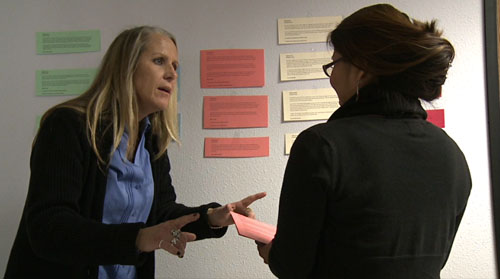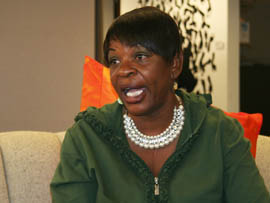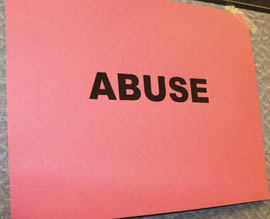Cronkite News has moved to a new home at cronkitenews.azpbs.org. Use this site to search archives from 2011 to May 2015. You can search the new site for current stories.
‘In Her Shoes’: Program focuses on choices that lead victims to sex trade
PHOENIX – Carolyn Jones is 15, working in a bar serving up drinks and dealing drugs to help her single mother support four other children in south Phoenix.
A nice older bar patron has offered her $100 for sex. She decides to go to a motel with him and take the money that can provide her with food for a couple of weeks.
He says she’s pretty. No one’s ever told her that.
Enticed by the money and flattered by his compliments, Jones starts to regularly see the man at the bar, exchanging sex for cash.
After admitting to her boyfriend what she does to support herself, he suggests finding her other customers so they can both live a better life. Not wanting to be on the streets again, she agrees.
Soon enough, Jones finds herself in what she calls “the game” of prostitution, addicted to drugs and alcohol. At 16, she becomes pregnant.
Jones’ story was part of an “In Her Shoes” simulation offered by the Arizona State University Diane Halle Center for Family Justice, where a group of reporters had to make choices faced by individuals who fell victim to sex trafficking.
Afterward, those who followed Jones’ choices had a chance to talk with her in person.
“As a teenager that’s what I did to survive … it was a way that I had food, a place to stay,” she said. “I felt like I was alone, like it was OK for people to violate me.”
Carrie Whitten-Simmons, director of communications for the center, said human sex trafficking is a “renewable commodity.”
“A lot of people think you have to cross borders, but sex trafficking is really just the recruitment and the harboring, transportation, provision or obtaining of a person for a commercial sex act in which the person actually has to be forced,” she said.
Sgt. Chris Bray of the Phoenix Police Department’s Vice Enforcement Unit said the city has seen an uptick in commercial sex trafficking in the past seven years.
“It’s the demand that drives this industry,” he said.
Whitten-Simmons said this increase is due to a variety of factors, including nice weather, the presence of the resort and entertainment industries and the Valley’s proximity to places like Los Angeles and Las Vegas.
Bray said breaking free from sex trafficking often depends on a victim having the motivation to change. That includes being willing to transition to jobs that aren’t necessarily as lucrative, he said.
“If they don’t have that economic empowerment then their lives aren’t going to change, they’re going to end up back where they are,” Bray said.
With a newborn daughter, Jones said she listened to friends who said they could help her get her life back on track. For the next 10 years, she created a life with her daughter before starting to abuse drugs again and facing the possibility of returning to the streets.
Instead, Jones turned to her family. When her older sister, Janice, asked to teach her how to “turn tricks,” she was hesitant but relented. Both sisters were on the streets and addicted to crack.
One night, Jones’ mother and another sister found her in a park and told her Janice had been strangled to death by a serial killer who targeted girls like her.
Jones said she was bitten by a brown recluse spider shortly after Janice’s funeral. The infection was so bad that she was placed in the hospital for a month, where she was forced to become sober.
She decided it was time to try for a better life again. She wound up in a halfway house and later met people from the Diane Halle Center.
For Jones, “the game” ended when she realized there were good people at the center who truly wanted to help her succeed.
“I’m honored to be here today,” said Jones, now 50. “Somebody planted a little seed of hope and it started sprouting.”
The center’s training simulation demonstrated the limited options and difficult decisions sex trafficking victims like Jones face.
“They’re selling their bodies for mere survival,” Whitten-Simons said.
The Diane Halle Center partners with nonprofits like the Coalition to End Arizona Sexual Exploitation (CEASE) to provide free legal and social services to victims.
“The only way that we can really help this woman and this girl is to holistically surround her with everything that is needed, from the medical examination to the police report to social services,” said Peggy Bilsten, CEASE’s executive director. “We follow them as long as they want.”
Both Bray and Whitten-Simmons said society’s outlook on prostitution needs to change.
“These young women and men are viewed as willing participants in this (prostitution) by society,” Bray said. “If we go with that view, we never get better, we never evolve as a society.”
Whitten-Simmons said society places a stigma on victims of sex trafficking.
“I don’t think I’ve ever known a girl who said, ‘When I grow up, I want to be a prostitute,’” she said.
Jones now works for StreetLight USA, a program that aims to eradicate child rape for profit. She said the girls seem to respond to her because she knows firsthand what they are going through.
“The call that’s on my life is to go back and try to help any girl, any woman, anybody who has been in the same place,” she said. “A fair chance at life, that’s all women need.”










